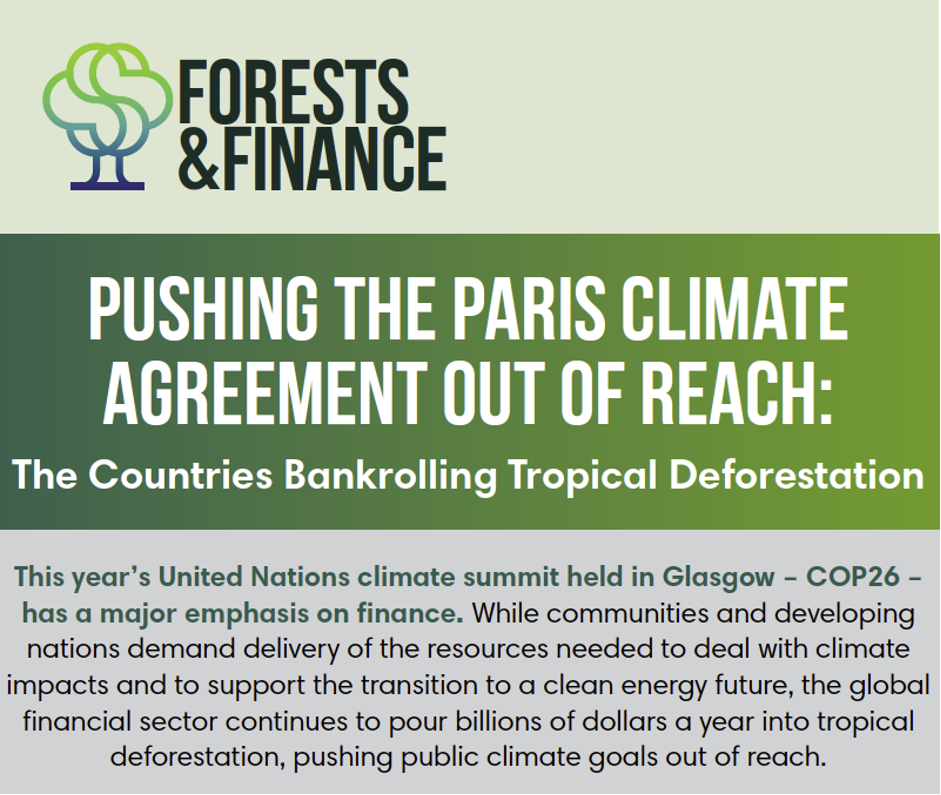News
Banking Centers of Brazil, Indonesia, China, the United States and Japan Are Bankrolling Global Deforestation, New Analysis Finds

More than USD 238 billion in credit has been provided to companies driving tropical deforestation globally since the Paris Climate Agreement
In the leadup to COP26, there have been numerous financial sector commitments promising action on climate and sustainability, framed as 2050 ‘Net Zero’ targets. New analysis shows, however, that banks and institutional investors continue to finance deforestation and related greenhouse gas emissions. Since the adoption of the Paris Climate Agreement in December 2015, commercial banks have provided more than USD 238 billion in credit to 300 companies linked to tropical deforestation globally. These companies were further funded by at least USD 41 billion in bond and shareholdings, as of May 2021. The banking sectors most responsible for financing tropical deforestation are those of Brazil, Indonesia, China, the United States and Japan.
According to new research by Forests & Finance –– a coalition of research groups and civil society organizations from the United States, Indonesia, Netherlands, Brazil, and Malaysia –– the overwhelming majority of money flowing to tropical forest-risk commodity sectors (specifically beef, palm oil, pulp and paper, rubber, soy, and timber) is provided by financial institutions without adequate policies or checks to safeguard against deforestation, the destruction of natural ecosystems, or human rights violations. This research included an assessment of the policies of 200 major banks and institutional investors involved in financing deforestation-risk companies. Tropical deforestation impacts the climate in myriad negative ways, including being one of the largest sources of greenhouse gas emissions.
“There is no climate stable future without forests, and yet banks are pushing the Paris Climate Agreement out of reach by funneling billions into deforestation globally,” said Jan Willem van Gelder at Profundo. “If governments continue to leave these financial flows unaddressed, there is little hope that we will achieve even the most conservative of our collective climate goals.”
“Bank after bank is promising 2050 Net Zero targets, while they continue bankrolling deforestation and climate chaos,” said Tom Picken at Rainforest Action Network (RAN). “We don’t need more roadmaps or 2050 goals with loopholes built in, such as offsetting. The solution is actually very simple. Stop financing forest destruction now. The world simply cannot afford further government and corporate greenwash and delay.”
“Our assessment of 200 of the biggest banks and investors found that environmental and social safeguard policies are extremely weak,” said Edi Sutrisno at TuK-INDONESIA. “Given the failure of the financial sector to curb investment into deforestation and fossil fuel expansion, governments must step in. We need stronger financial sector regulations to prohibit the financing of land grabbing, deforestation and fossil fuel expansion.”
###
CONTACT: Emma Rae Lierley, emma@ran.org, +1 425-281-1989
For further information on assessing financial sector climate targets, see the Principles for Paris-Aligned Financial Institutions, released in September 2020 by more than 60 climate and rights groups from around the world.
For further information on Net Zero targets and associated risks to climate integrity, forests and Indigenous Peoples, and forest-dependent communities, see the Net Zero Files by the CLARA initiative.
Forests & Finance is an initiative by a coalition of campaign and research organizations including Rainforest Action Network, TuK Indonesia, Profundo, Amazon Watch, Repórter Brasil, BankTrack, Sahabat Alam Malaysia, and Friends of the Earth US.